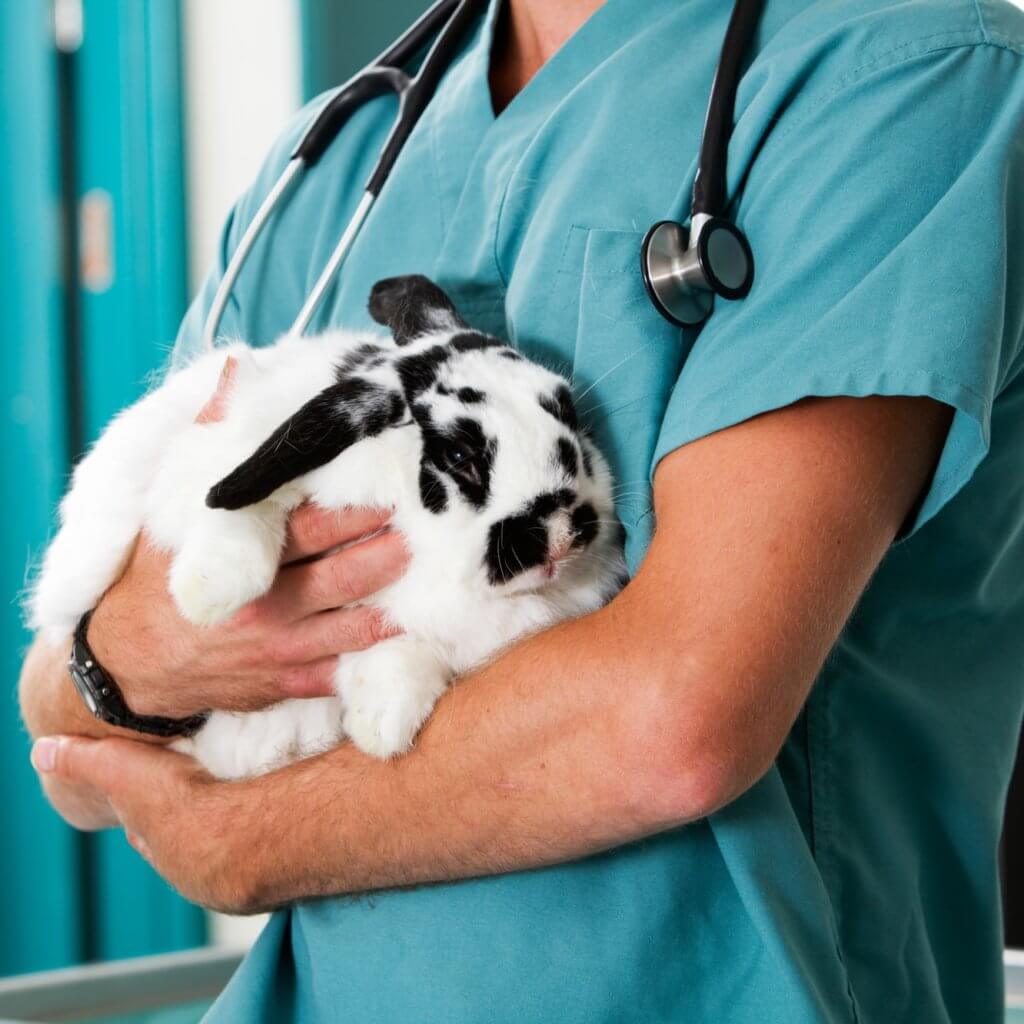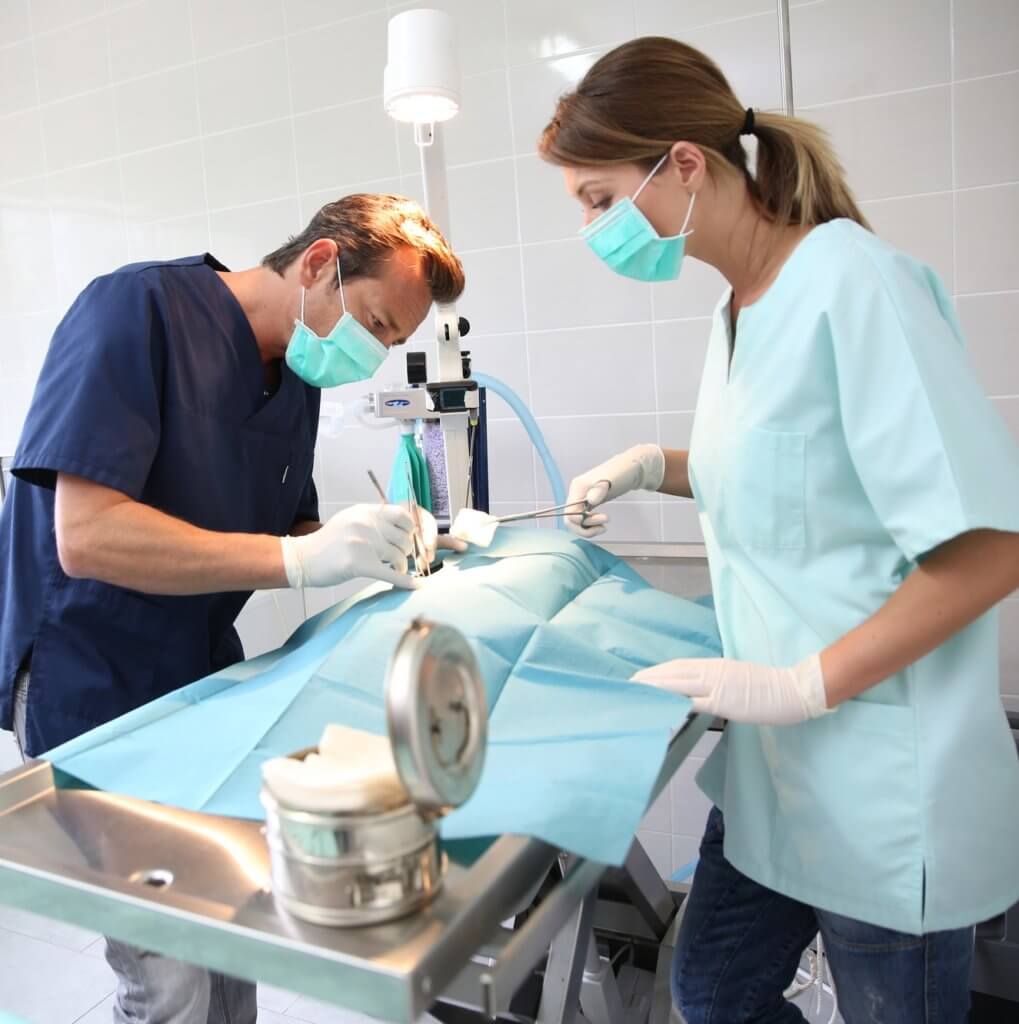What does a veterinary nurse do?
A veterinary nurse is someone who works alongside a veterinary surgeon at a surgery, clinic or hospital to care for sick or injured animals. They can specialise in a wide range of areas, from working with farm animals to exotic pets such as snakes. If you work at a vets practice, then you can expect your day to begin by cleaning out the kennels or other spaces in which in-patients are kept, then to be focussed on feeding and treating the in-patients. This will be followed by clinical work, assisting the vet surgeons with injections, medical treatments, bandaging and assisting with any necessary operations.
You should also be aware that animals do not get sick on a convenient nine to five timetable – this means you may well find yourself working evenings, weekends and even during national holidays such as Christmas and Easter. Your job will also not just be focussed on the pets or animals that need treatment – these animals have owners, and a large part of your role will involve interacting with and comforting these – often distressed – people.
You may also find yourself conducting home visits, especially for owners who are elderly or frail. In this way, you will not only be helping the animals, but also vulnerable members of your community.
“We help animals but what we do is also a great benefit to their owners too – helping vulnerable people keep their beloved companions with them through tough times.”
Jo Edwards, Veterinary Nurse
What is a registered veterinary nurse?
A registered veterinary nurse is a vet nurse who is registered with the Royal College of Veterinary Surgeons (RCVS). As this registration is a requirement for all vet nurses before they are allowed to practice, this means that if you are working in the role, then you should be a registered vet nurse.

What qualifications do you need to be a veterinary nurse?
To be a veterinary nurse, there are two main approaches. You may either undertake an undergraduate degree in veterinary nursing, or obtain a Level 3 Diploma in Veterinary Nursing through undertaking vocational training. You should ensure that your chosen course is accredited by the Royal College of Veterinary Surgeons (RCVS). The degree route is longer, but provides room for advancement in the future, and also to work in the pharmaceuticals industry, research or teaching. The qualifications required in each case are as follows:
- Undergraduate degree
- B in A Level Biology, and two other A Levels at grade C and above.
- 5 GCSEs including Mathematics at Grade 4 (C) or above.
- GCSE Grade 6 (A) in either Biology, Chemistry or Physics or similar.
- 70 hours of work experience with animals in a clinical setting.
- 70 hours of work experience with animals in a non-clinical setting.
- Vocational training
- A minimum of 5 GCSEs at Grade 4 (C) and above.
- This must include Mathematics, English Language and a Science subject.
In both cases, you must be registered with the RCVS in order to practice, even as a trainee.
What skills do you need to become a veterinary nurse?
To become a veterinary nurse, there are a number of skills it is vital to have. These include:
- Animal handling – first and foremost, if you hope to be a vet nurse, you need to be able to handle animals. Without this vital skill, it doesn’t matter how enthusiastic you are, you simply won’t be an effective vet nurse without it.
- Excellent communications skills – you’ll be working with others at all times, and constantly interacting with pet owners. Being able to clearly communicate to these individuals, who may be distressed, is a must.
- Reliable – you are being trusted with making potentially life-altering decisions, and with looking after beloved pets. As a vet nurse, you must be reliable and trustworthy as a result.
- Patient – animals are notorious for their ability to not act according to plan, and for not understanding that you are trying to help them. As such, being able to patiently wait for an animal to calm down or finish exploring your office will be a good skill.
- Good administrative skills – your role doesn’t just involve working with animals. You also have to conduct administrative tasks such as stock-checking, updating medical records and follow-up calls.
- Good teamwork – everything you do as a vet nurse will be as part of a team, either working with your administrators, assisting vet surgeons to deliver surgical interventions, or discussing treatment with vet technicians. Being able to work collaboratively will be key to delivering good treatment.
- Sound judgement – you won’t always have someone on hand to make a second judgement, especially if working evenings or holidays. As such, you will need to be able to make sound decisions under pressure when an emergency arises.
Do you need a degree to be a vet nurse?
In order to become a vet nurse, you do not need a degree. You can instead pursue a vocational training programme through a Royal College of Veterinary Surgeons accredited Level 3 Diploma in Veterinary Nursing.
This can be achieved at a college or other further education establishment, and the course will include full-time placements with the appropriate range of vet clinics and hospitals where needed. You may also conduct this vocational training alongside working full-time as a vet nurse in training, though this can take longer to achieve. You may also then top up your Level 3 Diploma into an undergraduate degree at a future date.
How long is a vet nurse course?
The length of your vet nurse course will vary depending on whether you choose to take an undergraduate degree or whether you opt to pursue vocational training. If you choose to undertake an undergraduate degree, you can expect to spend either 3 or 4 years in the course. A four year course will likely involve a placement year in industry. If choosing vocational training, it will be either 2 or 3 years long, and will include all the necessary placements you need to become a vet nurse. This also comes with the advantage of being able to work full-time as a trainee vet nurse while also studying, and does not require you to complete A Levels to allow you to apply.
“I didn’t have the “normal” life going out with friends because I was really busy [studying]. But it was so worth it because I’ve qualified as a veterinary nurse and have a career I’m really enjoying.”
Kirstie, Veterinary Nurse
Can a vet nurse become a vet?
As a registered veterinary nurse, you cannot easily become a veterinary surgeon. This is because the skills of a vet surgeon are significantly more advanced, and require a 5-6 year long degree level education at a veterinary school. However, experience as a vet nurse may help you when applying to veterinary schools. You may also be able to conduct an accelerated course to reflect your experience as a vet nurse, reducing the course potentially to 4-5 years instead of 5-6.
Steps to become a veterinary nurse
Step 1 – obtain work experience as a vet nurse
In order to work as a vet nurse, or even to begin training, you must demonstrate that you have developed animal handling skills. To do this, you will need to prove you have completed 70 hours of clinical work experience, and 70 hours of other work experience with animals. This will also have the added benefit of helping make sure you will enjoy a career as a vet nurse.
Step 2 – choose your path to qualifying
You will now have to choose whether you would prefer to become a vet surgeon via a vocational route, or instead by pursuing an undergraduate degree. The vocational route has the advantage of being significantly shorter as you do not have to complete A Levels and can instead begin training at 16 through a further education institution. However, an undergraduate degree will likely offer a greater range of career opportunities.
Step 3 – begin your training
Once you have chosen and successfully applied to your chosen path for qualification, you will begin your training. Both routes are going to require you to work hard, and will involve significant practical training with animals.
Step 4 – register with the Royal College of Veterinary Surgeons
Within your studies, you will be required to register with the RCVS. This is because a number of the practical skills you need to complete your training require you to be a registered trainee for legal reasons. Without registration, you cannot complete your training.
Step 5 – become a practicing veterinary nurse
Once you have completed your training, you will need to find and begin a job as a veterinary nurse. Many newly qualified vet nurses return to the establishment where they completed their placements, as the staff know them.
What is a vet nurse salary?
Vet nurse salaries increase significantly with seniority. You can expect to earn:
- Entry-level veterinary nurse: £17,800-£22,500
- Experienced veterinary nurse: £20,000-£30,000
- Senior/ head veterinary nurse: up to £45,000

Is vet nursing a good career?
If you enjoy working with animals, veterinary nursing is an excellent choice of career. While it is often competitive, there is good room for obtaining a role even without attending university, which can be achieved by obtaining practical experience and on-the-job training while undertaking studies at a college simultaneously. Unlike some roles, the opportunities for progression among vet nurses are limited – this means that the pay scale is limited. However, the role carries excellent levels of job satisfaction. There is also room to advance from veterinary nursing into management, leadership and training roles. Within these, you would be training or managing teams of junior vet nurses, or possibly even helping to manage the overall running of your vet practice.
Related occupations
- Veterinary surgeon
- Farm manager
- Kennel assistant
- Pet groomer
- Stablehand
- Dog trainer
- Dog walker
- Dog groomer

